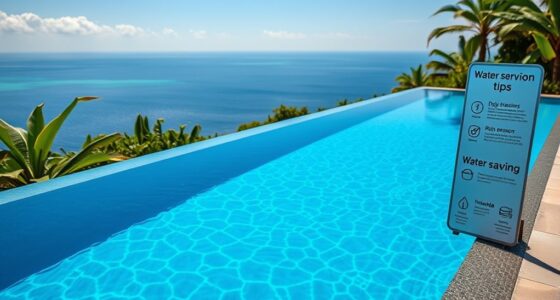Choosing between saltwater and chlorine systems for your infinity pool depends on your preferences for water quality, maintenance, and environment. Saltwater generates softer, gentler water that’s easier on your skin and eyes, with lower chemical handling. Chlorine pools are more straightforward and less costly upfront but require regular chemical additions. Saltwater often offers better long-term value and a more natural feel. To discover which system suits your pool design and lifestyle best, keep exploring the details ahead.
Key Takeaways
- Saltwater systems produce gentler, softer water with less irritation, enhancing comfort and aesthetic appeal in infinity pools.
- They have higher initial costs but lower ongoing chemical and maintenance expenses, offering better long-term value.
- Saltwater pools generate fewer chemical byproducts, reducing environmental impact and decreasing equipment wear and repairs.
- Proper safety precautions are essential when handling salts and chemicals, regardless of the system used.
- Saltwater’s natural, calming water quality complements modern infinity pool designs and enhances panoramic views.
How Saltwater and Chlorine Systems Generate Sanitizer

Saltwater and chlorine pool systems both produce sanitizer to keep the water clean and safe, but they do so through different processes. In a saltwater system, you add salt to the water, and a salt-chlorine generator (or salt cell) converts the salt into chlorine through electrolysis. This process continuously produces chlorine as long as the system runs, providing a steady supply of sanitizer. On the other hand, a traditional chlorine pool relies on adding chlorine manually or through floating dispensers, tablets, or liquid chlorine. The sanitizer then dissolves in the water, immediately working to eliminate bacteria and algae. While both methods generate the necessary disinfectant, the saltwater system automates chlorine production, offering a more consistent and convenient sanitization process. Saltwater systems can also reduce the need for handling and storing chemical chlorine, making pool maintenance safer and more straightforward.
Impact on Water Quality and Clarity

Both saltwater and traditional chlorine pools can achieve clear, appealing water when properly maintained, but they may influence water quality differently over time. Saltwater pools often produce softer water with fewer chemical residues, which can help prevent cloudiness caused by buildup. Chlorine pools, if not balanced correctly, may develop algae or cloudy water due to improper chemical levels. Regular testing and maintenance are essential to keep water quality high in both types.
- Saltwater pools tend to have more stable pH levels, reducing murkiness
- Chlorine pools may require more frequent chemical adjustments to prevent cloudiness
- Debris and algae are easier to control with appropriate water chemistry, regardless of system type
Effect on Skin, Hair, and Eye Comfort

While swimming in any pool can sometimes cause skin irritation or eye discomfort, saltwater pools are generally gentler on your skin and eyes compared to traditional chlorine pools. Saltwater systems produce less chlorine, which means reduced dryness and irritation. You’re less likely to experience red, itchy eyes or dry, flaky skin after swimming. Additionally, saltwater pools tend to have a more balanced pH level, helping prevent the harsh effects of high or low pH on your skin and eyes. You might notice fewer sensations of burning or stinging, making your swimming experience more comfortable. Overall, saltwater pools offer a softer, more soothing environment for your skin, hair, and eyes, allowing you to enjoy your time in the water without the common discomforts associated with chlorine-based systems. Furthermore, the color stability of saltwater pools can help preserve the clarity and brightness of the water over time.
Maintenance and Operational Costs

Maintaining a pool’s water quality and ensuring smooth operation can impact your long-term expenses considerably. Saltwater systems typically have higher initial setup costs but lower ongoing chemical expenses. Chlorine pools usually require purchasing chlorine tablets or liquid and regular testing.
Here’s what to contemplate:
- Equipment Maintenance: Saltwater systems need occasional cell cleaning, while chlorine pools require regular chemical balancing.
- Chemical Costs: Saltwater pools save money on chemicals over time, but may need occasional salt refills. Chlorine pools often need more frequent chemical purchases.
- Energy Consumption: Saltwater generators can increase electricity bills, whereas traditional chlorine systems generally use less energy.
- Somatic therapy techniques can also be employed to help pool owners manage stress related to maintenance routines, promoting overall well-being.
Understanding these costs helps you plan your budget effectively for long-term pool ownership.
Environmental Considerations

Choosing between saltwater and chlorine pools also involves considering their environmental impact. Saltwater pools generate fewer chemical byproducts, reducing chemical runoff into local water sources. They also require less frequent chemical additions, lowering manufacturing and transportation emissions. Chlorine pools, on the other hand, often depend on chlorine production, which consumes significant energy and releases pollutants. Additionally, saltwater systems tend to produce fewer chemical byproducts, making them a more eco-friendly option overall.
Longevity and Equipment Durability

Saltwater pools often have a longer lifespan for their equipment because the gentler nature of saltwater reduces corrosion and wear, especially on pumps, filters, and heaters. This means your pool systems might need fewer repairs and replacements over time. Saltwater’s lower chemical intensity limits mineral buildup and corrosion, helping your equipment stay in top shape longer. You’ll notice less frequent maintenance and more reliable operation. Imagine fewer trips to the pool store and fewer unexpected breakdowns. To visualize, consider:
- Pumps and filters that stay cleaner and last longer
- Heaters with reduced corrosion risks
- Reduced mineral buildup inside plumbing and equipment
This durability can save you money and effort, making saltwater systems a practical choice for long-term pool enjoyment. Additionally, understanding corrosion resistance can further enhance your pool’s longevity and performance.
Ease of Use and User Experience

When it comes to ease of use, you’ll find that saltwater pools generally require less maintenance and are gentler on your skin. Handling chemicals is simpler, with fewer adjustments needed compared to traditional chlorine pools. This can make your swimming experience more comfortable and hassle-free overall. Additionally, filter replacement for saltwater systems tends to be less frequent, further reducing maintenance efforts.
Maintenance Simplicity
Maintaining a pool can be straightforward or frustrating, depending on the system you choose. With saltwater systems, you typically experience less daily upkeep, thanks to automated chlorine generation. Chlorine pools often require manual addition of chlorine and regular testing, which can be time-consuming. Saltwater systems tend to be more user-friendly, reducing the chances of over- or under-shocking.
Consider these points:
- Saltwater pools automate chlorine production, minimizing manual interventions
- Chlorine pools need regular chemical balance checks and chemical additions
- Salt systems often have fewer maintenance tasks, but salt cell cleaning is occasionally necessary
Water Comfort Level
Because saltwater pools generally have a more gentle chlorine level, they tend to feel softer and less harsh on your skin, eyes, and hair. You’ll notice a smoother, more pleasant sensation in the water, making your swimming experience more comfortable. Saltwater systems produce fewer chemical odors, so you won’t deal with the strong chlorine smell often associated with traditional pools. The water feels silkier and less drying, reducing irritation even after prolonged exposure. This means you can relax and enjoy your swim without constantly worrying about redness or discomfort. Additionally, saltwater pools can support vibrational well-being by creating a more calming environment that enhances relaxation and overall experience. While both systems are designed to keep the water clean, saltwater pools provide a more natural and gentle feel, enhancing your overall user experience and encouraging longer, more enjoyable swims.
Chemical Handling Ease
Saltwater pools simplify chemical management since they generate chlorine automatically through a salt chlorinator, reducing the need for frequent manual additions. This makes maintaining balanced water easier and less stressful. You won’t have to handle harsh chemicals or measure precise amounts regularly. Instead, you add salt once and rely on the system to keep chlorine levels steady. With chlorine pools, you’ll spend more time measuring, adding chemicals, and adjusting pH. The process can be more complex and messy. Saltwater systems also tend to produce fewer strong chemical odors, creating a more pleasant experience. Additionally, the antimicrobial properties of saltwater help keep the pool cleaner with less chemical intervention.
Safety and Handling of Chemicals

Handling pool chemicals safely is essential to prevent accidents and guarantee a healthy swimming environment. Always wear gloves and goggles when mixing or adding chemicals, and store them in a cool, dry place away from children and pets. Keep chemicals in clearly labeled containers to avoid confusion. Use a dedicated scoop for each chemical to prevent cross-contamination. Here’s a quick safety guide:
| Chemical Type | Safety Tip |
|---|---|
| Chlorine | Add slowly and in well-ventilated areas |
| Salt | Handle with dry hands to avoid splashes |
| pH Adjusters | Store upright to prevent leaks |
Staying cautious minimizes risks and ensures your infinity pool remains safe for everyone. Proper storage and handling are especially important when considering dog-safe pool chemicals, so always choose products that are safe for pets.
Compatibility With Infinity Pool Design

Infinity pools are designed to create a seamless visual effect where the water appears to merge with the horizon, making the choice of pool chemistry essential for maintaining that aesthetic. Your pool’s style and placement can influence whether a saltwater or chlorine system fits best. Saltwater systems tend to produce softer water that complements sleek, modern designs without harsh chemical smells or residues. Chlorine systems, however, are highly adaptable and can work well with various architectural styles, especially if you prefer precise control over water clarity. Consider how your pool’s materials and finishes interact with each system. – Soft, clear water that enhances panoramic views – Minimal chemical residue on pool surfaces – Compatibility with sleek, unobstructed pool edges – Regional regulations and local water quality can influence the most suitable system for your infinity pool.
Long-Term Investment and Value

When considering the long-term value of your pool, you’ll want to compare maintenance costs and how equipment holds up over time. Saltwater systems often have higher initial expenses but may save you money on upkeep, while chlorine pools might require more frequent replacements. Additionally, a well-maintained pool can boost your resale value, making it a smart investment for the future.
Maintenance Costs Over Time
While both saltwater and chlorine pools require ongoing maintenance, their long-term costs can differ markedly. Saltwater systems generally have higher initial setup costs but may save you money over time due to fewer chemical purchases. Chlorine pools often need regular chemical balancing, which adds up financially and time-wise. Saltwater pools typically require less frequent chemical adjustments, reducing ongoing expenses. However, salt can cause corrosion, leading to potential maintenance or replacement of certain parts. To visualize the costs:
- Frequent chemical purchases and balancing for chlorine pools
- Higher initial investment for saltwater system installation
- Potential corrosion-related repairs in saltwater pools
Understanding these factors helps you weigh the long-term financial commitment of each system. Your choice impacts not just your upfront budget but ongoing expenses as well.
Equipment Durability and Longevity
The durability and longevity of pool equipment considerably influence your long-term investment and the overall value of your system. Saltwater systems typically use corrosion-resistant materials, extending equipment life, while chlorine systems may cause faster wear due to chemical stress. To better understand, consider this comparison:
| Feature | Saltwater System | Chlorine System | Impact on Longevity |
|---|---|---|---|
| Corrosion Resistance | High | Moderate to Low | Longer lifespan |
| Maintenance Frequency | Lower | Higher | Reduced replacement needs |
| Equipment Cost | Slightly higher initially | Lower | Potential savings over time |
| Material Quality | Designed for salt exposure | Not always resistant | Increased durability |
| Expected Lifespan | 10-15 years | 5-10 years | Better long-term value |
Choosing the right system affects how long your equipment lasts, impacting long-term value.
Resale Value Enhancement
Investing in a saltwater pool can considerably boost your property’s resale value compared to traditional chlorine systems. Buyers often prioritize low-maintenance, eco-friendly features, making saltwater pools attractive. This can make your home stand out in a competitive market, attracting more interested buyers. Additionally, a saltwater system’s reputation for gentler water and reduced chemical smell appeals to health-conscious buyers.
Consider these benefits:
- Increased home appeal due to modern, eco-friendly features
- Lower future maintenance costs, a selling point
- Enhanced reputation for quality and comfort, attracting higher offers
Frequently Asked Questions
Which System Is Better for Saltwater or Chlorine in Terms of Algae Prevention?
You’ll find that chlorine systems are generally better at preventing algae because they deliver a consistent, high level of sanitizer that actively kills algae spores. Saltwater systems produce chlorine more gradually, which might be less effective if not properly maintained. However, with correct balance and regular testing, both systems can prevent algae effectively. Your choice depends on your maintenance preferences and how you want to manage chemical levels in your infinity pool.
How Do Saltwater and Chlorine Systems Affect Pool Temperature Regulation?
You’ll find that saltwater and chlorine systems don’t substantially impact your pool’s temperature regulation. For example, a homeowner with a saltwater infinity pool noticed stable temperatures even during hot summer days, thanks to the minimal heat transfer from the salt generator. Both systems primarily disinfect the water, but they don’t alter how your pool retains or loses heat. So, choose based on other preferences, knowing temperature stability remains consistent.
Are There Specific Maintenance Challenges Unique to Saltwater or Chlorine Pools?
You’ll find that saltwater pools require less chemical addition but need regular monitoring of salt levels and occasional equipment checks for corrosion. Chlorine pools demand consistent chemical balancing and disinfectant adjustments, which can be time-consuming. Saltwater systems might also have higher initial setup costs, while chlorine pools need ongoing chemical purchases. Both require routine cleaning and filter maintenance, but saltwater pools often need more attention to salinity and equipment longevity.
Can Saltwater or Chlorine Systems Be Customized for Different Infinity Pool Designs?
Imagine customizing a suit to fit your style—that’s how you can tailor saltwater or chlorine systems for your infinity pool. You can select features like automated dosing, UV sterilization, or variable flow rates to match your design and usage needs. For example, some owners add saltwater systems with adjustable salt levels to seamlessly blend aesthetics with comfort. With proper planning, both systems can be adapted to enhance your unique infinity pool experience.
What Are the Health Implications of Long-Term Exposure to Each System?
Long-term exposure to saltwater can cause skin dryness, irritation, and potential corrosion of pool equipment, while chlorine exposure may lead to respiratory issues, skin dryness, and eye irritation. You might notice more skin and eye comfort with saltwater, but it requires maintenance to prevent corrosion. Chlorine is effective at disinfecting but can cause more irritation over time. Consider your sensitivities and pool maintenance needs when choosing a system.
Conclusion
So, whether you choose saltwater or chlorine for your infinity pool, one thing’s clear: both promise pristine water, but only one might turn your paradise into a chemical lab. Ironically, what seems like a “safer” option could still require constant vigilance, costly maintenance, and a love for bubbly surprises. In the end, it’s not just about the water quality—it’s about balancing your dream pool with the unpredictable dance of chemicals. Happy swimming!









